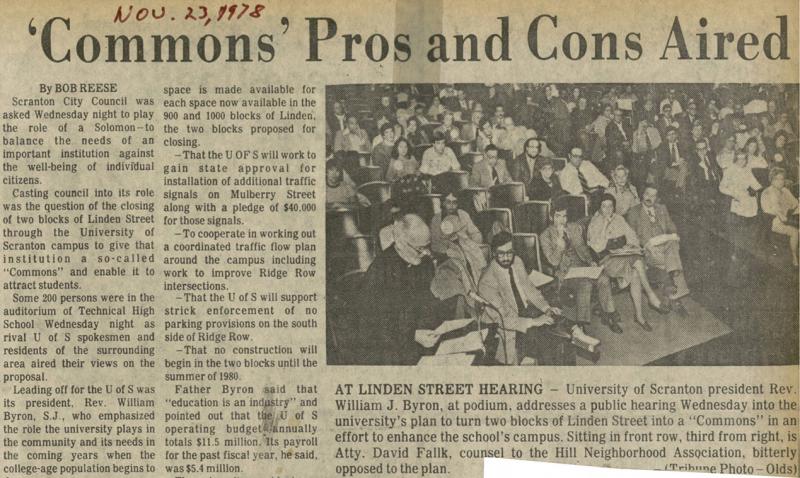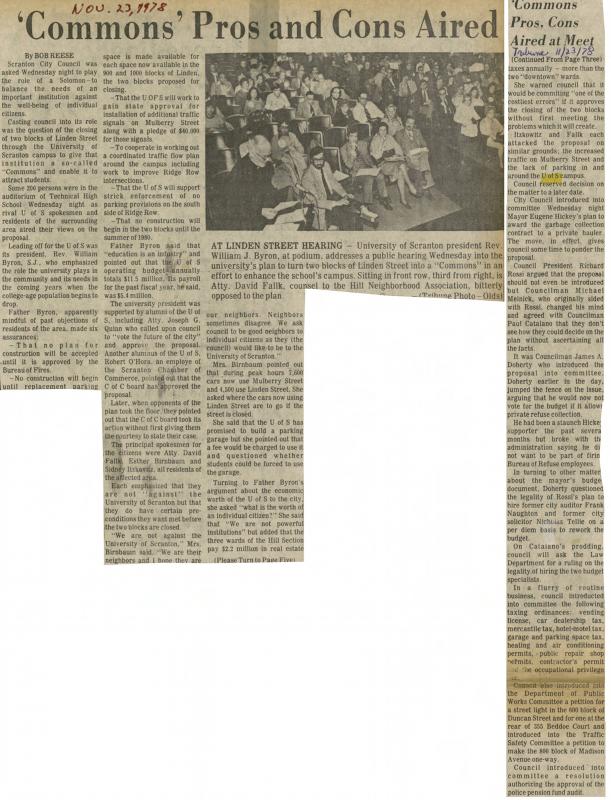Commons Pros and Cons Aired, 1978
Item
- Title
- Description
- Date
- Creator
- Subject
- Source
- Record Identifier
- Exhibit Section
- Copyright
- Transcript
-
Commons Pros and Cons Aired, 1978
-
Scranton Tribune article regarding a Scranton City Council meeting about the plans to turn a portion of Linden Street into the University of Scranton Commons.
-
1978-11-23
-
University of Scranton Archives
-
univscrapbook-b044_0262b
-
Times Shamrock Communications
-
[Please note that computer-generated transcripts include formatting, spelling, and grammatical irregularities and errors.]
November 23, 1978
'Commons' Pros and Cons Aired
By BOB REESE
Scranton City Council was asked Wednesday night to play the role of a Solomon-to
balance the needs of an important institution against the well-being of individual
citizens.
Casting council into its role was the question of the closing of two blocks of Linden Street through the University of Scranton campus to give that institution a so-called "Commons" and enable it to attract students.
Some 200 persons were in the auditorium of Technical High School Wednesday night as rival U of S spokesmen and residents of the surrounding area aired their views on the proposal.
Leading off for the U of S was its president, Rev. William Byron, S.J., who emphasized the role the university plays in the community and its needs in the coming years when the college-age population begins to drop.
Father Byron, apparently mindful of past objections of residents of the area, made six assurances:
-That no plan for construction will be accepted until it is approved by the Bureau of Fires.
-No construction will begin until space is made available for each space now available in the 900 and 1000 blocks of Linden, the two blocks proposed for
closing.
-That the U OF S will work to gain state approval for installation of additional traffic signals on Mulberry Street along with a pledge of $40,000 for those signals.
-To cooperate in working out a coordinated traffic flow plan around the campus including work to improve Ridge Row intersections.
-That the U of S will support strict enforcement of no parking provisions on the south side of Ridge Row.
-That no construction will begin in the two blocks until the summer of 1980.
Father Byron said that "education is an industry" and pointed out that the U of S
operating budget annually totals $11.5 million. Its payroll for the past fiscal year, he said, was $5.4 million.
The university president was supported by alumni of the U of S, including Atty. Joseph G. Quinn who called upon council to "vote the future of the city" and approve the proposal. Another alumnus of the U of S, Robert O'Hora, an employee of
the Scranton Chamber of Commerce, pointed out that the C of C board has approved the proposal.
Later, when opponents of the plan took the floor, they pointed out that the C of C board took its action without first giving them the courtesy to state their case.
The principal spokesmen for the citizens were Atty. David Fallk, Esther Birnbaum and Sidney Itzkovitz, all residents of the affected area.
Each emphasized that they are not "against" the University of Scranton but that
they do have certain preconditions they want met before the two blocks are closed.
"We are not against the University of Scranton," Mrs. Birnbaum said. "We are their
neighbors and I hope thev are our neighbors. Neighbors sometimes disagree. We ask
council to be good neighbors to individual citizens as they (the council) would like to be to the University of Scranton."
Mrs. Birnbaum pointed out that during peak hours 7,600 cars now use Mulberry Street and 4,500 use Linden Street. She asked where the cars now using
Linden Street are to go if the street is closed.
She said that the U of S has promised to build a parking garage but she pointed out that a fee would be charged to use it and questioned whether students could be forced to use the garage.
Turning to Father Byron's argument about the economic worth of the U of S to the city, she asked "what is the worth of an individual citizen?" She said that "We are not powerful institutions" but added that the three wards of the Hill Section
pay $2.2 million in real estate
(Please Turn to Page Five)
Commons Pros, Cons Aired at Meet
(Continued From Page Three)
taxes annually - more than the two "downtown" wards.
She warned council that it would be committing "one of the costliest errors" if it approves the closing of the two blocks without first meeting the problems which it will create.
Itzkowitz and Fallk each attacked the proposal on similar grounds; the increased
traffic on Mulberry Street and the lack of parking in and around the U of S campus.
Council reserved decision on the matter to a later date.
City Council introduced into committee Wednesday night Mayor Eugene Hickey's plan to award the garbage collection contract to a private hauler. The move, in effect, gives council some time to ponder the proposal.
Council President Richard Rossi argued that the proposal should not even be introduced but Councilman Michael Melnick, who originally sided with Rossi, changed his mind and agreed with Councilman Paul Catalano that they don't see how they could decide on the plan without ascertaining all the facts.
It was Councilman James A. Doherty who introduced the proposal into committee. Doherty earlier in the day, jumped the fence on the issue, arguing that he would now not vote for the budget if it allowed private refuse collection.
He had been a staunch Hickey supporter the past several months but broke with the administration saying he did not want to be part of firing Bureau of Refuse employees. In turning to other matters about the mayor's budget document, Doherty questioned the legality of Rossi's plan to hire former city auditor Frank Naughton and former solicitor Nicholas Tellie on a per diem basis to rework the budget.
On Catalano's prodding, council will ask the Law Department for a ruling on the legality of hiring the two budget specialists.
In a flurry of routine business, council introduced into committee the following
taxing ordinances: vending license, car dealership tax, mercantile tax, hotel-motel tax, garage and parking space tax, heating and air conditioning permits, public repair shop permits, contractor's permits and occupational privilege tax.
AT LINDEN STREET HEARING - University of Scranton president Rev. William J. Byron, at podium, addresses a public hearing Wednesday into the university's plan to turn two blocks of Linden Street into a "Commons" in an effort to enhance the school's campus. Sitting in front row, third from right, is Atty. David Fallk, counsel to the Hill Neighborhood Association, bitterly
opposed to the plan. - (Tribune Photo-Olds)
- Item sets

